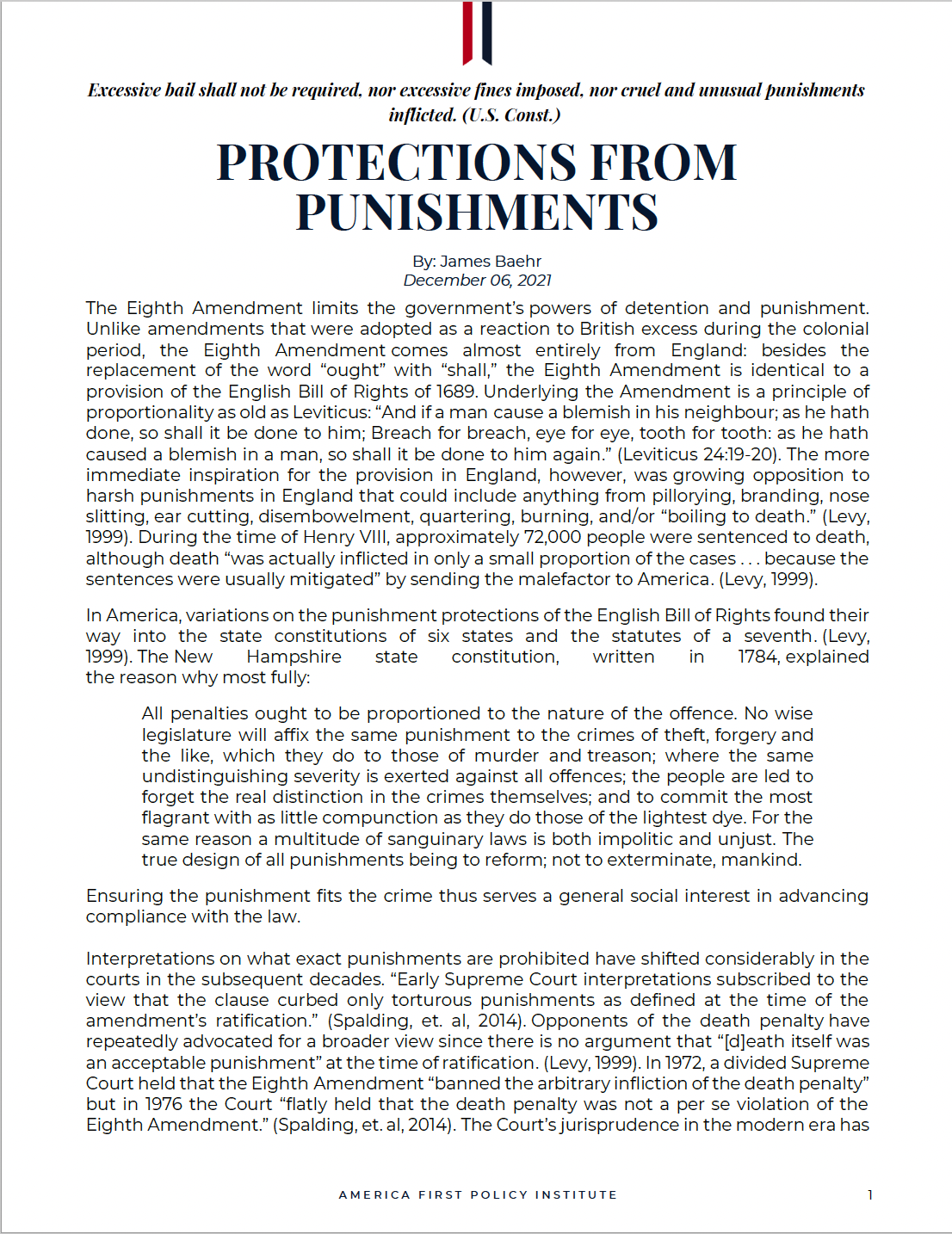Protections From Punishments
Excessive bail shall not be required, nor excessive fines imposed, nor cruel and unusual punishments inflicted. (U.S. Const.)
The Eighth Amendment limits the government’s powers of detention and punishment. Unlike amendments that were adopted as a reaction to British excess during the colonial period, the Eighth Amendment comes almost entirely from England: besides the replacement of the word “ought” with “shall,” the Eighth Amendment is identical to a provision of the English Bill of Rights of 1689. Underlying the Amendment is a principle of proportionality as old as Leviticus: “And if a man cause a blemish in his neighbour; as he hath done, so shall it be done to him; Breach for breach, eye for eye, tooth for tooth: as he hath caused a blemish in a man, so shall it be done to him again.” (Leviticus 24:19-20). The more immediate inspiration for the provision in England, however, was growing opposition to harsh punishments in England that could include anything from pillorying, branding, nose slitting, ear cutting, disembowelment, quartering, burning, and/or “boiling to death.” (Levy, 1999). During the time of Henry VIII, approximately 72,000 people were sentenced to death, although death “was actually inflicted in only a small proportion of the cases . . . because the sentences were usually mitigated” by sending the malefactor to America. (Levy, 1999).
In America, variations on the punishment protections of the English Bill of Rights found their way into the state constitutions of six states and the statutes of a seventh. (Levy, 1999). The New Hampshire state constitution, written in 1784, explained the reason why most fully:
All penalties ought to be proportioned to the nature of the offence. No wise legislature will affix the same punishment to the crimes of theft, forgery and the like, which they do to those of murder and treason; where the same undistinguishing severity is exerted against all offences; the people are led to forget the real distinction in the crimes themselves; and to commit the most flagrant with as little compunction as they do those of the lightest dye. For the same reason a multitude of sanguinary laws is both impolitic and unjust. The true design of all punishments being to reform; not to exterminate, mankind.
Ensuring the punishment fits the crime thus serves a general social interest in advancing compliance with the law.
Interpretations on what exact punishments are prohibited have shifted considerably in the courts in the subsequent decades. “Early Supreme Court interpretations subscribed to the view that the clause curbed only torturous punishments as defined at the time of the amendment’s ratification.” (Spalding, et. al, 2014). Opponents of the death penalty have repeatedly advocated for a broader view since there is no argument that “[d]eath itself was an acceptable punishment” at the time of ratification. (Levy, 1999). In 1972, a divided Supreme Court held that the Eighth Amendment “banned the arbitrary infliction of the death penalty” but in 1976 the Court “flatly held that the death penalty was not a per se violation of the Eighth Amendment.” (Spalding, et. al, 2014). The Court’s jurisprudence in the modern era has been marked less by a historical evaluation of practices at the time of ratification and more by focusing on the “evolving standards of decency that mark the progress of a maturing society” in the words of Chief Justice Earl Warren (Trop v. Dulles, 356 U.S. 86 (1958)). The death penalty has been subsequently prohibited by the Court for certain crimes (rape, including child rape) and categories of people (juveniles). The debate continues – with the Court’s more liberal members advocating for the “evolving standards” approach (even turning to international opinion to help decide the question) and the Court’s conservatives decrying an approach that hinges on “the subjective views of five Members of this Court and like-minded foreigners.” Roper v. Simmons, 543 U.S. 551 (2005) (Scalia, J., dissenting).
AUTHOR BIOGRAPHY
James Baehr is a Senior Fellow of the America First Policy Institute. He is a Major in the Marine Corps Reserve and served as a Special Assistant to the President.
WORKS CITED
U.S. Const. amend. VII
Constitution of the State of New Hampshire. (1784). https://en.wikisource.org/wiki/Constitution_of_New_Hampshire_(1784)
Leviticus 24:19-20, King James Version
Levy, Leonard. (1999). Origins of the Bill of Rights. Yale University Press.
Spalding, M. & Forte, D. (Eds.). (2014). The Heritage guide to the Constitution. Regnery Publishing.
The English Bill of Rights (1689) https://www.legislation.gov.uk/aep/WillandMarSess2/1/2#commentary-c2144673
